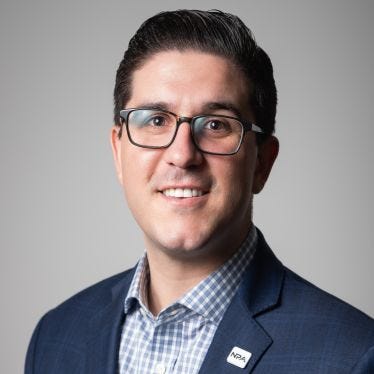Kyle Turk, director of government affairs with the Natural Products Association (NPA), offers an overview of bills introduced this year in state legislatures that would limit access to natural products, including supplements marketed for weight loss.
.png?width=850&auto=webp&quality=95&format=jpg&disable=upscale)
A recent inaccurate Washington Post column repeated the same lies the industry’s critics have spewed for years. Only this time, he shared the quiet part out loud. Harvard’s STRIPED (Strategic Training Initiative for the Prevention of Eating Disorders) group has doubled down on its narrative that healthy habits like exercising and using recovery supplements like creatine and protein cause body dysmorphia along with eating disorders.
Our opponents are more empowered than ever, and they’re not only focusing on Washington. More and more, we see state legislators teaming up with special interest groups to use copycat approaches and false premises in attempts to blame nutritional supplements and natural products for all sorts of societal challenges. Nearly of these attempts are not based on science, data or even common sense. They are pure political plays designed to garner attention for their sponsors at the expense of reasonable dialogue and legitimate policymaking. Thankfully, NPA’s advocacy team and national grassroots network are pushing back.
Keeping up with the draconian and scientifically baseless proposals impacting the dietary supplement industry can be burdensome. Consider that in 2022 alone, more than 122,000 pieces of legislation were introduced in state legislatures across the country. The industry has stepped up to this challenge by engaging our grassroots campaigns, resulting in more than 30,000 letters to state capitals supporting the dietary supplement industry. Despite this silver lining, our work in the state legislatures is still dominated by blocking dangerous and costly proposals that would restrict, reduce or eliminate access to supplements, or impose dramatically higher costs for consumers, manufacturers, distributors and retailers.
This is why making our voices heard is especially critical for all of us in our industry. One of the best ways is to register and participate in NPA’s Fly-In Day, where our members and allies get the opportunity to meet with members of Congress and their staff to promote the benefits of policies that support the dietary supplement industry. While it is sometimes challenging to explain the devastation some of these radical proposals would wreak for consumer access to supplements, it is growing even more critical that we do so together. We simply cannot afford to let our guard down when our industry is literally under siege from all levels of government.
Below, I have summarized bills in half a dozen states that represent assaults on the industry.
California
AB 82
California is home to a significant portion of the dietary supplement industry. Last year, thousands of health and wellness advocates wrote to their lawmakers in Sacramento, urging their opposition to AB 1341, which restricted and prohibited access to dietary supplements. Former Assemblywoman Christina Garcia led the bill. Due in part to NPA’s formal request and official testimony in opposition to the bill, Gov. Gavin Newsom vetoed AB 1341, and a working group was established to examine dietary supplements. As a result of NPA’s advocacy, we were invited to participate in this working group and presented data during the last working group meeting. We are grateful to be part of the solution and look forward to our continued work with the working group tasked with providing recommendations to Gov. Newsom. Unfortunately, despite this working group’s infancy, Assemblymembers Akilah Weber, Gail Pellerin and Cecilia Aguiar-Curry have reintroduced identical legislation restricting and prohibiting access to dietary supplements under AB 82. The legislation has been referred to the Assembly Health and Judiciary Committees and awaits votes before the Oct. 14 deadline.
Massachusetts
H2215/S1465
Massachusetts is not only the home of the Boston Tea Party but also numerous anti-supplement legislative proposals. State Rep. Kay Kahn has once again introduced her proposal H2215/S1465 to restrict access to supplements. Just as we have in all previous years, NPA will officially testify in opposition to this misguided approach. Legislative leadership remains generally opposed to her bill despite her efforts to attract cosponsors. In previous years, the Joint Committee on Public Health recommended passing the bill, and Rep. Kahn attempted to tack on the provisions to health care legislation. NPA was able to defeat those efforts, and the legislation has yet to be added to the Joint Committee on Public Health agenda.
But restricting access to dietary supplements is only one of the other threats on the Massachusetts agenda. Delegate James Murphy introduced H.1697, which would restrict access and prohibit the sale of energy drinks to people under 18. His legislation defines an energy drink as a beverage that exceeds the caffeine content of 71 or more milligrams per 12-ounce serving and contains taurine and glucuronolactone.
The legislation also defines an energy drink as a soft drink classified as a dietary supplement containing 80 or more milligrams of caffeine per 8 ounces. Generally, it includes a combination of B vitamins and herbal ingredients. If you are as surprised as we were to see that B vitamins were singled out, see for yourself here. Fortunately, the legislation has yet to be on the agenda for the Joint Committee on the Judiciary. Still, it should be carefully watched to see if Delegate Murphy attempts to use the Kay Kahn playbook by attempting to include his legislation in a broader health care omnibus.
Maryland
HB634/S602
Maryland is a relative newcomer to this debate, but NPA was prepared and engaged very early in the legislative process to thwart a similar attempt to ban or restrict access to supplements. Our testimony and meetings revealed that many lawmakers and their staff were unaware of how FDA and FTC regulate our industry. Despite the fact the committees of jurisdiction held hearings on the bills, the Maryland legislature adjourned for the session prior to the bill receiving a vote. While this is a victory for the industry, we have an active strategy to continue educating Maryland lawmakers throughout the year to encourage their opposition to the bill.
New Jersey
A3512/S2387
Last year, Assemblyman Herb Conaway pushed hard to move his legislation, A3512/S2387,
through the assembly health committee. As seen in other states during the committee hearing process, the support and opposition broke down along party lines, with Democrats generally in favor and Republicans generally opposed. One friend of our industry, Sen. Bob Singer, said it would be ridiculous if he had to mail his college-age daughter vitamin D because she was not old enough to purchase it herself. Despite this effort, the legislation has yet to be presented to the entire assembly or senate for a full vote.
The legislation is not expected to receive a full vote by either chamber for the next several weeks as the legislature addresses its obligation to present the governor with a budget before the end of the fiscal year on June 30. There have been signals from Gov. Phil Murphy’s administration that he would be open to signing this legislation should it reach his desk. So, once the budget is passed, we expect Assemblyman Conaway to make a full-court press during the remainder of the year.
New York
S5823/A5610
Much like California, on the final day of 2022, New York’s Governor Kathy Hochul vetoed a bill to restrict supplement access. However, Sen. Shelley Mayer and Assemblywoman Nily Rozic have reintroduced their proposal with several new provisions. In addition to prohibiting the sale of dietary supplements to people under 18, the legislation also requires proof of legal age for purchasing products if the consumer appears to be under 25.
In addition, the bill specifies products such as creatine, green tea extract, raspberry ketone, Garcinia cambogia and green coffee extract will be restricted. The bill also restricts products labeled, marketed or categorized that express or imply the product will help maintain muscle or increase strength; or modify, maintain or reduce body weight, fat, appetite, overall metabolism, or the process by which nutrients are metabolized. In the last week, both bills have passed out of committee and have been added to the floor calendar.
Colorado
SB123-176
NPA is also playing offense, and Colorado’s SB 123-76 is one of the most significant victories we’ve enjoyed on this issue to date. That’s because it was a rare occasion when NPA was given the opportunity to be part of a reasonable and open discussion about science, facts and data. The result was meaningful traction with legislators and special interest groups pursuing supplement restrictions. The legislation at issue was a comprehensive package designed to help Coloradans who suffer from an eating disorder. However, some provisions aimed to restrict and prohibit access to dietary supplements. Yet again, NPA testified in opposition.
As in other states, the deck appeared stacked against the industry since the senate majority leader, Dominick Moreno (D), sponsored the legislation. In response, we activated our grassroots campaign that garnered over a thousand letters to lawmakers in Denver. This led to a joint meeting with the majority leader and the eating disorder community that truly sealed the deal. After our presentation showing FDA has no data connecting the use of eating disorders to any dietary supplement, the majority leader and the eating-disordered community agreed with NPA that the legislation be amended to remove provisions restricting or prohibiting access to dietary supplements.
Get involved and stay involved
NPA and its grassroots network were very successful in 2022, but the threats from all levels of government to our industry and consumers are only growing stronger and more widespread. If we are to continue our advocacy, it is more critical than ever that our industry steps up to meet this challenge. Whether you have a vested interest in sports nutrition, NAC, NMN, CBD, personal care, or other ingredients and products, educating lawmakers and demonstrating all the good that our industry provides must be part of your business plan.
Advocacy is just like diet and exercise related to fitness: It must be sustained to see results. This includes attending NPA’s June 7 Fly-in-Day, where you’ll have an opportunity to educate Congress about how the industry benefits consumers. This is a powerful experience and, in many ways, the most basic form of the democratic process. As an attendee, you will spend the day meeting with your elected representatives or their staff to discuss critical issues facing the industry.
Members of Congress will always feel the weight of an issue when a constituent can make a personal connection—and drawing upon those stories is quite effective. For our industry, this includes everything from job creation to all we do to keep the nation healthy day in and out. It includes contributions of resources to the NPA PAC (Political Action Committee) or your time to present testimony during legislative hearings on the merits of our industry. And it takes vigilance and commitment, so please regularly visit the NPA Action Network to check out the latest grassroots campaigns.
As the old saying goes, success has a hundred fathers, but failure is an orphan. For the industry to continue to thrive, we all must take part in the policy and political processes; otherwise, our consumers will be left in the dust.
Kyle Turk is director of government affairs with the Natural Products Association (NPA).
About the Author(s)
You May Also Like






.png?width=800&auto=webp&quality=80&disable=upscale)